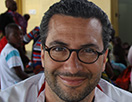This session will provide participants with an overview of progress in malaria control and elimination over the past decade, and the ongoing transition from a one-size-fits-all to a tailored approach.
Learning Objectives:
- To understand the progress in malaria control and elimination over the past decade, including successes, failures, and challenges.
- To understand the WHO policy-setting process for malaria, and the public health cycle linking research, policy-setting, program implementation, surveillance, monitoring, and evaluation.
- To appreciate the opportunities and challenges for malaria control and elimination in the near future, and the implications for ultimate malaria eradication efforts.
This session will provide a review of lessons learned from the Smallpox Eradication Program, the Polio Eradication Initiative, and regional and national Measles Elimination Programs. These lessons relate to epidemiologic, virologic, immunologic, sociologic, and anthropologic sciences and management, vaccine supply, and logistics.
Learning Objectives:
- To gain knowledge of the epidemiology of the disease, in particular details on modes of transmission, which are fundamental to a successful elimination or eradication program.
- To understand the use of appropriate intervention tools (vaccines, drugs, diagnostics) to achieve elimination and, ultimately, eradication.
- To learn about effective surveillance as fundamental component to all aspects of disease eradication and how it must be increased progressively as cases become fewer and harder to detect.
- To review the ways in which an elimination or eradication program must be flexible and ready to address unexpected obstacles that arise during the final kilometers on the road to eradication.
This session will provide an introduction to malaria biology, including malaria epidemiology, parasite-vector relationships, vector control, cell biology, and biochemistry of the parasite red cell interaction, drug action and resistance mechanisms, parasite genetics, and cell biology. Participants are expected to be familiar with the life cycle and general biology of malaria parasites. Those who do not have a background in biology or medical parasitology, or who require a primer should review the suggested reading materials and referenced website.
Learning Objectives:
- To understand the biology and life cycle-basis for this disease, including global public health aspects of malaria.
- To understand the incidence and distribution of infection and disease within human populations, determinants of frequency and distribution, methods of measurement, and magnitude and consequence of disease on the population.
- To consider the interrelationship of organisms and their environments, including identify ways of reducing the incidence and/or severity of disease within populations, obstacles, and consequences.
The recent call for malaria eradication has re-emphasized Plasmodium vivax into the research agenda. Plasmodium vivax remains the most widely distributed human malaria parasite with 2.85 billion people living at risk of infection, and it is increasingly being recognized as a cause of severe disease.
The biology, ecology, and epidemiology of Plasmodium vivax is distinct to that of other malaria parasites, presenting unique challenges for elimination. Present tools designed to combat Plasmodium falciparum will not be effective against Plasmodium vivax, requiring specific investment for the development of tools and control measures for this species.
Learning Objectives:
- Participants will gain a better understanding of the public health importance of Plasmodium vivax.
- To review the key gaps in our knowledge of Plasmodium vivax biology, ecology, and epidemiology.
- To understand the difficulties in eliminating Plasmodium vivax, and to review possible solutions for elimination of this species.
This session will cover the different aspects of mosquito biology that are key to parasite development and malaria transmission.
Learning Objectives:
- To develop an understanding of the complexity of malaria transmission by the mosquito vector.
- To discuss present challenges facing vector control.
- To identify opportunities to block malaria transmission by the mosquito.
Although often not the focus of malaria control interventions, social, cultural, and behavioral factors not only affect transmission, but can also impose major barriers for the uptake of important control strategies (e.g., bednet use). Similarly, environmental factors (natural environment – such as climate, land cover; human-made environment – e.g., housing conditions, land use) play a major role in malaria transmission, and historically were the target of control interventions.
This session will adopt a systemic view of malaria to discuss how these factors could be addressed with well-established and/or novel combinations of control strategies (in light of historical and contemporary evidence), and reflect on the challenges, feasibility, and likely sustainability of these interventions for achieving malaria eradication at present.
Learning Objectives:
- To identify important social, cultural, and behavioral factors that affect the pattern and the level of local malaria transmission.
- To review strategies that could be incorporated into malaria control efforts to address social, cultural, and behavior factors.
- To introduce different types of environmental interventions for malaria control, and to present historical and contemporary evidence on the respective effectiveness of those interventions.
- To discuss the feasibility of social and environmental interventions as strategies for current efforts of malaria eradication.
This session will draw from participant’s expertise on malaria control to promote knowledge building through shared experiences. Discussion will be guided based on answers provided by participants to a questionnaire inquiring about control interventions adopted in their countries. By promoting an open discussion about problems and solutions (or lack of thereof) dealt with in different contexts, this session seeks to summarize programmatic opportunities and challenges for NMCPs.
Learning Objectives:
- To promote learning through shared experience.
- To identify differences and similarities in opportunities and challenges for malaria control in countries represented in the course.
This session will provide a review of the epidemiological and operational features of the three main vector control tools: insecticide treated nets (ITNs), indoor residual spraying (IRS), and larviciding.
Learning Objectives:
- To understand the essential concepts and epidemiological features of ITNs, IRS, and larviciding.
- To understand the comparative operational strengths and weaknesses of ITNs, IRS, and larviciding as malaria control interventions, as well as their combinations.
The tools and tactics required for active infection detection to support malaria elimination are different than those that have been successful for passive case detection/control phase purposes. This session will provide participants with the ability to: recognize the differences between activity passive case detection; define the unique needs of elimination/active infection detection; translate those needs to biomarker and product requirements; analyze how existing tools meet those requirements; and understand the current product pipeline.
Learning Objectives:
- To provide an understanding of the diagnostic product development perspective/process, including Target Product Profile (TPP) development and new diagnostic products to support malaria elimination.
- To provide an overview of the unique needs associated with correctly identifying the asymptomatic reservoir.
- To provide an overview of existing diagnostic product strengths and limitations, products in the development pipeline, and “what to expect” in the next five years.
This session will provide a general introduction to parasite biology, with focus on malaria transmission, malaria biology, and the role of asymptomatic reservoir. Participants will also be provided with an overview of diagnostic and population genetic tools to detect and quantify parasites, including transmission stages. The application of these tools will be discussed in the context of intervention studies and the broader elimination agenda.
Learning Objectives:
- To understand the biology of malaria transmission and the role of asymptomatic reservoir.
- To understand the current tools to measure transmission in the field.
- To provide an understanding of genetic tools for surveillance.
This session will introduce the concept of surveillance-response and how surveillance-response approaches and systems can and should be tailored to different transmission and elimination settings.
Learning Objectives:
- To understand the concept of surveillance as intervention and how this leads to tailored surveillance-response approaches and systems in different transmission and elimination settings.
- To distinguish the surveillance-response approaches that are based on the minimal essential data collected in space and time from the traditional concept of monitoring and elimination where generally maximally possible data are collected.
This session will be split into two sessions, one group of participants will focus on malaria elimination in Mesoamerica and another group will focus on malaria elimination in South East Asia. Both cohorts will discuss the epidemiological context as well as the advantages and disadvantages to pursuing malaria elimination in these regions. In addition, participants will analyze the health systems implications of scaling up elimination in a Southeast Asian country.
Learning Objectives:
- To recognize the epidemiological context and operational challenges to designing an elimination strategy in the Mesoamerican region.
- To identify potential obstacles in the organization of the elimination campaign.
- To identify potential actors that are required to be engaged in the elimination campaign.
- To identify the successful elements of the Philippines’ approach to malaria elimination.
- To describe the malaria program requirements of two health system building blocks in the Philippines.
- To develop a strategic plan for the two chosen building blocks for the effective scaling up of the malaria elimination approaches, derived from the Philippines case study, to reach the vision of a Philippines free of malaria by 2020.
This session will be split into two sessions, one group of participants will focus on malaria elimination in Mesoamerica and another group will focus on malaria elimination in South East Asia. Both cohorts will discuss the epidemiological context as well as the advantages and disadvantages to pursuing malaria elimination in these regions. In addition, participants will analyze the health systems implications of scaling up elimination in a Southeast Asian country.
Learning Objectives:
- To recognize the epidemiological context and operational challenges to designing an elimination strategy in the Mesoamerican region.
- To identify potential obstacles in the organization of the elimination campaign.
- To identify potential actors that are required to be engaged in the elimination campaign.
- To identify the successful elements of the Philippines’ approach to malaria elimination.
- To describe the malaria program requirements of two health system building blocks in the Philippines.
- To develop a strategic plan for the two chosen building blocks for the effective scaling up of the malaria elimination approaches, derived from the Philippines case study, to reach the vision of a Philippines free of malaria by 2020.
The session will be divided into two sections (30 minutes of lecture, followed by 30 minutes of presenter-led group discussion). During the first section, a brief overview of past and current efforts to eliminate malaria through the use of drug-based strategies will be conducted. Emphasis will be placed on the differences between the “control mode” vs. the “elimination mode.” Characteristics of drugs that could be ideal for elimination purposes will be discussed, and the state of the art regarding the use of antimalarials for elimination presented. During the discussion, participants will be encouraged to discuss the adequacy of different drug regimens (combination of drugs) used for elimination, as opposed to control purposes.
Learning Objectives:
- To understand the differences between the use of antimalarial drugs to control malaria and to eliminate malaria.
- To review the different characteristics of antimalarial drugs and what would make a drug (or a combination of drugs) ideal for elimination purposes.
- To discuss the role of drugs in past control/elimination efforts, and what lessons could be learnt from these.
This session will provide participants with an understanding of the development and appropriate incorporation of a malaria vaccine into an integrated control and elimination, and ultimately eradication program that may well be the lynchpin needed to achieve the vision of a world free of malaria. A WHO-sponsored update to the Malaria Vaccine Technology Roadmap has highlighted two overlapping strategic goals: 1) prevention of clinical malaria, and 2) reduction of malaria parasite transmission. These two strategic goals drive three desired outcomes: 1) preventing infection; 2) averting cases; and 3) blocking transmission. The focus of the effort to develop vaccines that interrupt malaria parasite transmission (VIMTs) are those that prevent human infection (anti-infection vaccines; AIVs) and those that block transmission of sexual stage parasites to mosquitoes (transmission-blocking vaccines; TBVs). Efforts directed at developing AIVs and TBVs will be presented for discussion.
Learning Objectives:
- To review the outcome of the recent WHO-sponsored update to the Malaria Vaccine Technology Roadmap as a strategic foundation for the development of new malaria vaccines.
- To discuss the biological, technical, and regulatory challenges and opportunities in developing both types of VIMTs: AIVs and TBVs.
This session will provide an overview of the new medicines, which will be available by 2025 for use in an eradication agenda; the key questions which need to be addressed in clinical development, and the remaining unmet medical needs.
Learning Objectives:
- To understand how drug discovery has changed in the last decade with the increased success of phenotypic based screens.
- To understand what can and cannot be done with new medicines and the importance of having targets.
- To understand the importance of both clinical safety and efficacy when developing new medicines.
As of February 2015, artemisinin resistance has been confirmed in 5 countries of the Greater Mekong sub-region (GMS): Cambodia, the Lao People’s Democratic Republic, Myanmar, Thailand, and Vietnam. This session will review the current threat, with a focus on Southeast Asia.
Learning Objectives:
- To understand the definition of artemisinin resistance in Southeast Asia.
- To understand resistance to partner drugs.
- To understand mechanisms of emergence and spread of antimalarial resistance.
Malaria vector control still relies primarily on chemical insecticides, either for indoor residual spraying (IRS), long-lasting insecticide treated bed nets (LLINS), larvicides for controlling mosquitoes in their aquatic stages, or space spraying. This session will focus on the widespread failure of these insecticides, to achieve the desired level of toxicity on targeted mosquito populations (i.e. insecticide resistance), and how this situation may hinder malaria elimination in different parts of the world. Insecticide resistance is now widespread in most countries, and is one of the most significant challenges in the history of malaria vector control. Unfortunately, the WHO has recommended only 12 chemicals for IRS (including pyrethroids, organophosphates, organochlorides, and carbamates), and only six (all of which are pyrethroids) for use on bed-nets. According to The WHO’s World Malaria Report of 2014, 53 of the 65 reporting countries had experienced insecticide resistance, 41 of these countries reporting resistance to two or more classes of insecticide resistance. Given the overreliance on insecticide based control, the slow pace at which new chemical formulations are being developed, and the rise of resistance, it is of utmost urgency to analyze the resistance situation and identify practical methods to address the challenge.
Learning Objectives:
- To gain a basic understanding of insecticide resistance, its various forms, its effects on malaria control, and how it could hinder malaria elimination.
- To gain a working knowledge of how to detect and monitor resistance in mosquito populations.
- To understand the main methods for managing and/or controlling insecticide resistance.
- To learn how to distinguish between physiological resistance and behavioral resistance in mosquito populations, and the main disadvantages of these two manifestations of resistance.
Group discussion based on previous learnings from the course and participant perspectives.
This session will review key aspects to consider in supply chain management for non-specialists, including the main bottlenecks to an effective and efficient supply chain; turning the chain upside down (the view from the demand side); and finding the solutions.
Learning Objectives:
- To understand the links between demand and supply, including the role of forecasting (who does it?).
- To understand the relationship between public and private distribution networks.
- To understand the role of incentives in delivery and distribution.
This session will cover the fundamentals of health systems, including: 1) approaches to health systems strengthening key components and functions, and 2) challenges related to health systems strengthening for malaria – from leadership and governance to financing and delivery.
Learning Objectives:
- To learn the fundamental concepts in health systems thinking and strengthening.
- To review some of the key challenges for health systems strengthening for malaria, with special emphasis on eradication strategies.
Malaria prevention and treatment are among the most cost effective of public health interventions, and provide a consistent return on investment. Yet the levels of political commitment and financial investment required to sustain malaria control are high, and experience has shown that they are challenging to maintain. This session will provide participants with an overview of the investment case for malaria within an eradication framework.
Learning Objectives:
- To understand current investment patterns for malaria.
- To be able to identify where investment gaps exist.
- To become familiar with the health and economic benefits of investing in malaria, including for malaria eradication.
This session will feature a moderated discussion on the basics of health systems thinking and on how disease specific interventions can be tailored to given health and social systems and in general also contribute to health systems strengthening.
Learning Objectives:
- To understand the principles of integrated approaches of malaria interventions in different endemic settings with different health and social systems.
- To develop and understand the key principles and practical approaches for integrated elimination efforts under health systems constraints.
Certification of malaria elimination is the official recognition of malaria-free status granted by the WHO. Certification confirms to the international community that the country, at that point in time, has halted local transmission by Anopheles mosquitoes, and that it has created an adequate system for preventing its re-establishment. Certification of malaria elimination is granted for a country as a whole and for all four human malaria species. This session will provide participants with an overview of the WHO’s malaria-free certification process and basic principles.
Learning Objectives:
- To understand the context and the general principles of certification of malaria elimination.
- To comprehend the steps of the process for certification.
- To learn the reporting requirements to the WHO after certification and the measures needed for prevention of reintroduction.
This session features a lecture with short discussion blocks to generate the basis for the potential and principles of applied modeling for public health action.
Learning Objectives:
- To develop and understand the position and potential of modeling for malaria elimination/eradication with regards to:
- feasibility of engaging in elimination;
- integrated, mixed interventions; and
- the cost-effectiveness of the intervention mixes.
- To learn about novel tools for elimination planning (applied modeling and WHO/Elimination Scenario Planning).
Innovative Vector Control Consortium (IVCC) is a Product Development Partnership working across a wide variety of stakeholders to catalyze innovation in vector control. This session will address the importance of vector control in an eradication agenda.
Learning Objectives:
- To gain a better understanding of the role of vector control in malaria eradication, including gaps that must be filled in order to deliver a suite of tools to support an eradication agenda.
- To discuss and explore issues such as:
- why the global malaria community needs innovation;
- opportunities and challenges in the technology pipeline; and
- delivery of new solutions to intervention funders and countries.
The session will expose participants to the concept of social marketing and discuss its applicability for public health, especially malaria prevention.
Learning Objectives:
- To develop a framework for social marketing of public health.
- To anchor the concept on a thorough understanding of consumer behavior.
- To understand the role of marketing and where it fits in the overall scheme of malaria prevention.
Strong, integrated communications, and advocacy drive progress and policy change on global health issues. This session will explore the pillars of successful communications and advocacy, including engaging influential stakeholders, developing effective messages, translating complex concepts for the general public, conducting media outreach, and building a social media presence. Examples from past global health campaigns will illustrate powerful strategies that have changed the global health landscape, dramatically increased resources to fight disease, and ultimately saved millions of lives. Participants will be encouraged to apply these best practices to major challenges and opportunities in the global malaria effort.
Learning Objectives:
- To review the purpose of advocacy and communications and basic tools used.
- To introduce examples of effective advocacy and communications campaigns in global health.
- To explore ways of employing tactics to advance malaria eradication objectives.
Collective discussion of the case The Novartis Malaria Initiative where all class members are expected to participate. At the end of the session, the instructor will share some concluding remarks.
Learning Objectives:
- To develop analytical sensitivity to the issues of large pharma companies in the development and dissemination of antimalarial (or any other high-impact treatment for primarily low-income nations).
- To analyze the strengths and weaknesses of different models, and the implications of different private-public partnerships.
- To learn about the reach and limitations of non-commercial and commercial approaches.
The malaria field has changed rapidly over the past decade. Enormous growth in resources for commodities has driven scale-up of programs, creating challenges to every aspect of the value chain to impact. New global financing structures, including GFATM, UNITAID, and PMI have been created and are functional. A timely review of the Roll Back Malaria Partnership has identified factors driving change in global governance.
Learning Objectives:
- To understand key functions of global health governance.
- To identify major drivers for change of global governance for malaria in 2015.
- To understand how the post-215 Sustainable Development Goals affect the ability to make malaria elimination/eradication a global priority.























